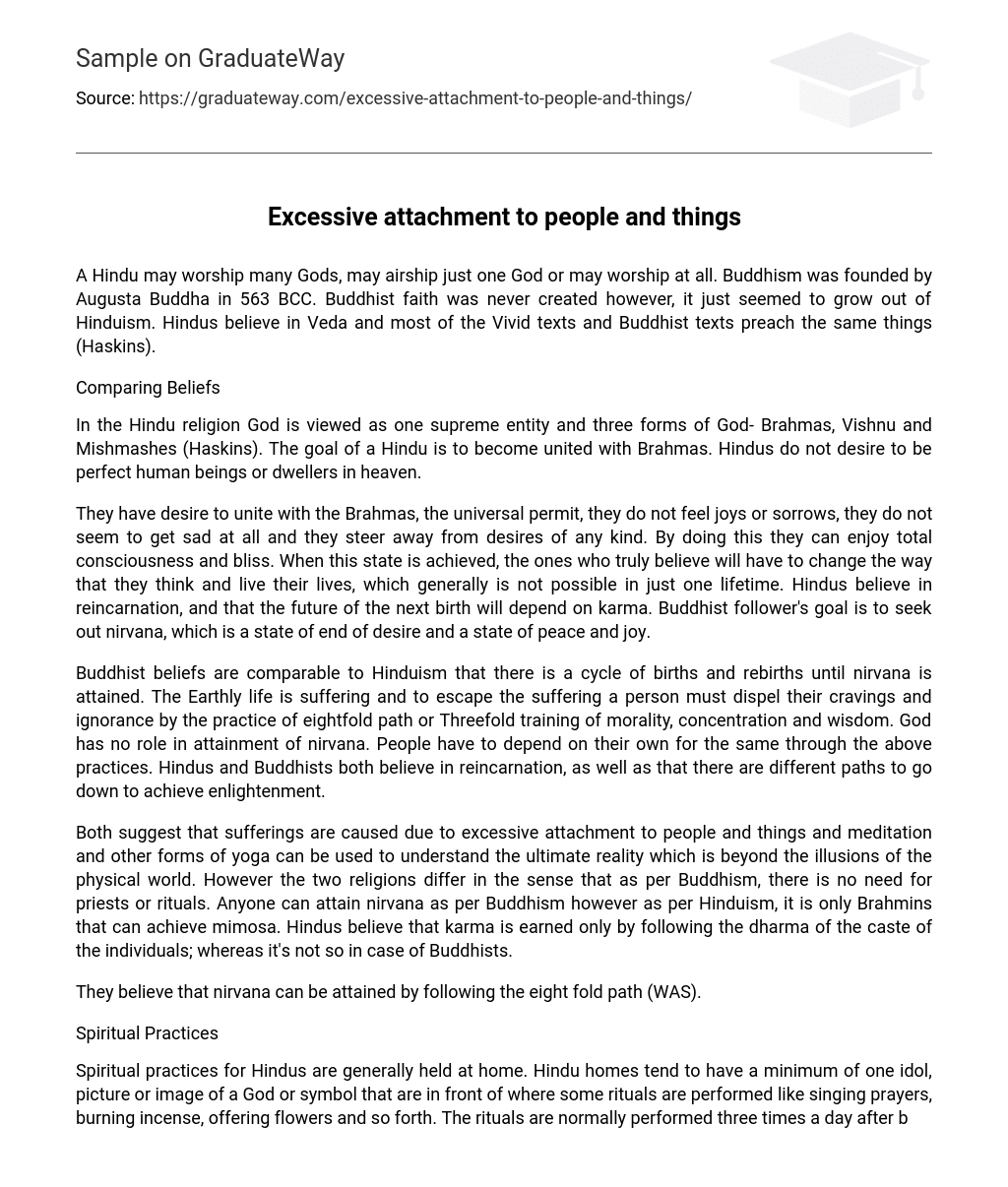A Hindu may worship many Gods, may airship just one God or may worship at all. Buddhism was founded by Augusta Buddha in 563 BCC. Buddhist faith was never created however, it just seemed to grow out of Hinduism. Hindus believe in Veda and most of the Vivid texts and Buddhist texts preach the same things (Haskins).
Comparing Beliefs
In the Hindu religion God is viewed as one supreme entity and three forms of God- Brahmas, Vishnu and Mishmashes (Haskins). The goal of a Hindu is to become united with Brahmas. Hindus do not desire to be perfect human beings or dwellers in heaven.
They have desire to unite with the Brahmas, the universal permit, they do not feel joys or sorrows, they do not seem to get sad at all and they steer away from desires of any kind. By doing this they can enjoy total consciousness and bliss. When this state is achieved, the ones who truly believe will have to change the way that they think and live their lives, which generally is not possible in just one lifetime. Hindus believe in reincarnation, and that the future of the next birth will depend on karma. Buddhist follower’s goal is to seek out nirvana, which is a state of end of desire and a state of peace and joy.
Buddhist beliefs are comparable to Hinduism that there is a cycle of births and rebirths until nirvana is attained. The Earthly life is suffering and to escape the suffering a person must dispel their cravings and ignorance by the practice of eightfold path or Threefold training of morality, concentration and wisdom. God has no role in attainment of nirvana. People have to depend on their own for the same through the above practices. Hindus and Buddhists both believe in reincarnation, as well as that there are different paths to go down to achieve enlightenment.
Both suggest that sufferings are caused due to excessive attachment to people and things and meditation and other forms of yoga can be used to understand the ultimate reality which is beyond the illusions of the physical world. However the two religions differ in the sense that as per Buddhism, there is no need for priests or rituals. Anyone can attain nirvana as per Buddhism however as per Hinduism, it is only Brahmins that can achieve mimosa. Hindus believe that karma is earned only by following the dharma of the caste of the individuals; whereas it’s not so in case of Buddhists.
They believe that nirvana can be attained by following the eight fold path (WAS).
Spiritual Practices
Spiritual practices for Hindus are generally held at home. Hindu homes tend to have a minimum of one idol, picture or image of a God or symbol that are in front of where some rituals are performed like singing prayers, burning incense, offering flowers and so forth. The rituals are normally performed three times a day after bathing. A meal is first offered to the deity (worshiped person), and then eaten up by the members of the household.
Important life events from rite to death in a person’s life are all accompanied by ceremonies performed by some priest. Priests are also known to perform many different rituals that are held in the temples. Prayers are offered four times a day however a Hindu is not obligated to attend the prayers. Festivals are celebrated with even more rituals and processions. Meditation, yoga and yoga are also practiced as a way to connect with the Atman/ Brahmas. In Buddhism also, meditation is highly focused upon. Nirvana can be achieved only through the practice of eightfold path or three fold training.
Instead of God, Buddhists believe in mindfulness. So the rituals are usually replaced by practices such as meditation to establish peace and awareness all around the world.
Practices Today
The many different practices of religion develop over a period of time. The modern view of Hinduism today believes that all living things have a soul. Today there are many that believe that there is no such thing as reincarnation or hell. The practices of today involve not being violent, having good behavior and a love for all people. Some of the newer discoveries that have been made today have helped form these views.
Buddhism has also evolved and developed more with time. Many consider Buddhism to be a philosophy, instead of a religion. The way that Buddhism is practiced today usually fluctuates depending on the region. In the western regions traditional practices seemed to change more toward the western traditions and the increasing dominance of science. Giving to the poor, helping those that are in need, meditation, reciting mantras and chants and going on retreats are the shared practices in all of the regions. The trend of the west is to practice Buddhist chants as well as meditation.
In the East, the rotational and newer practices are not that much different but the practice of giving up all worldly possessions and wandering has been reducing.
World
Some of the practices of Hinduism are Arrived, Hath Yoga, Kindling Yoga, Names Greeting, Pupas, Temples and other rituals. Many people use yoga around the world today to relieve stress and to gain a piece of mind and to have a spiritual experience. Some of the practices of Buddhism are meditation; following five precepts do not kill, do not lie, do not engage in sexual misconduct, do not steal and do not get drunk and following eight fold path (Religion acts).





